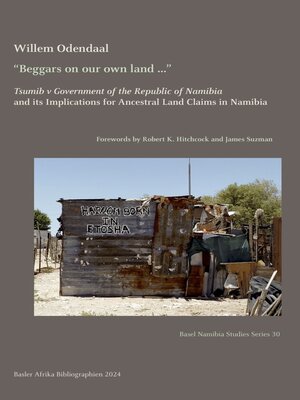"Beggars on our own land ..."
ebook ∣ Tsumib v Government of the Republic of Namibia and its Implications for Ancestral Land Claims in Namibia
By Willem Odendaal

Sign up to save your library
With an OverDrive account, you can save your favorite libraries for at-a-glance information about availability. Find out more about OverDrive accounts.
Find this title in Libby, the library reading app by OverDrive.



Search for a digital library with this title
Title found at these libraries:
| Library Name | Distance |
|---|---|
| Loading... |
In 1954, the Haillom people were evicted from Etosha by the South African-con-trolled South West African Administration. In 2015, the Haillom filed the case of Tsumib v Government of the Republic of Namibia in the High Court of Namibia. "Beggars on our own land ..." unravels the historical and contemporary socio-legal complexities that led to the Tsumib case. At the core of the case lies the legal question, how can the Haillom people approach the Namibian Courts in order to claim compensation for the loss of their ancestral lands? Odendaal goes into detail how the Tsumib case materialised under the post-inde-pendence Namibian constitutional discourse. He assesses the Namibian land re form programme and its oversight in dealing with historical land dispossessions. He inspects Haillom "identity" and how it was used to strengthen their case. He concludes with an examination of Namibia's outdated and restrictive legal frame-work, which ultimately denied the Haillom people their constitutional right to be heard in the Namibian Court. While the future of ancestral land claims in Namibia depends on the political will of the Namibian government, Odendaal argues that the Namibian courts have a duty to comply with the rights giving nature of the Namibian Constitution that lays the foundation for the Haillom people's ancestral claims.







